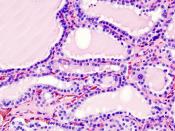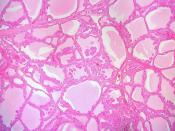I. INTRODUCTION.
The thyroid is a small gland in the neck that takes up iodine from the body to produce hormones that help control the body's metabolism, and regulate how quickly the body should work and use energy. "About 20 million Americans have some form of thyroid disease, including many who may not be aware of their condition" (NWHIC, 1998). Thyroid hormone is essential for maintaining normal function of almost all organs in our body. It is very important for regulating growth and metabolism.
Thyroid disease occurs when the level of hormone secreted by the thyroid gland is too high or too low (Joyce, 1998). Thyroid disorders cause various symptoms; the two main types of disorders are hypothyroidism, such as Hashimoto's thyroiditis, and hyperthyroidism, such as Graves' disease (NWHIC, 1998). Both conditions can be difficult to diagnose because they produce relatively mild symptoms. Hence, "thyroid disorders are often misdiagnosed as depression, aging, or other causes of tiredness, fatigue, or forgetfulness" (NWHIC, 1998).
Therefore, a thyroid disorder is a possibility that must be ruled out in diagnoses of conditions such as "depression, fibromyalgia, lupus, sleep disorders, and various other conditions" (TFA, n.d.), fortunately, "diagnosis of thyroid problems is relatively specific by blood tests of thyroid hormone levels" (Joyce, 1998). Thyroid disorders are treatable, but can be serious if untreated, so any suspicion of thyroid problems needs to be confirmed promptly by a doctor.
II. DISEASES OF THE THYROID.
"Thyroid diseases are 10 times more common in women than in men" (NWHIC, 1998), as mentioned earlier the two main types of thyroid disorders are;
i. Hypothyroidism
ii. Hyperthyroidism
i. Hypothyroidism, or underactive thyroid, develops when the "thyroid gland fails to produce or secrete as much thyroxine (T4) as the body needs" (Haggerty, 2001). Because T4 regulates such "essential functions as heart rate,



Good
IT is very good in detail.. too many quotes used.
And you are describing the more severe symptoms of hypo and hyper thyroid.. Talk about the levels too.
Overall, good.
0 out of 0 people found this comment useful.